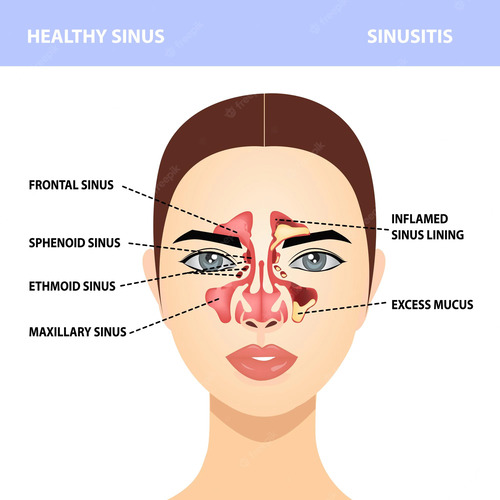What is Sinus Infection (Sinusitis)? Types, Causes, Symptoms

The sinuses are inflamed when they suffer from sinusitis. In the head, there are four pairs of cavities (spaces). There are narrow channels connecting them. Nasal channels drain thin mucus from the sinuses. By draining the nose, bacteria can be kept at bay. When the sinuses become blocked, fluid can fill them instead of air. As a result, bacteria can grow and cause an infection (bacterial sinusitis). If the nasal tissue is inflamed, it is almost always swollen. The illness is also refer to as rhinosinusitis. Many organs are involve in sinus infection, which is a complicate condition. The sinuses in your head can become infected with a sinus infection. ENT specialists can identify sinus-related complications and suggest the best treatment option if you have any sinus-related complications. Anyone can get a sinus infection. Sinusitis is more likely to occur in people with nasal allergies, nasal polyps, asthma, and abnormal nose structures. Sinus infections can also be caused by smoking.
A cold, allergies, and sinus infection can be difficult to differentiate. Colds typically develop, peak, and then fade away slowly. It lasts between a few days and a week. There is a possibility of developing a sinus infection from a cold. In the end, it depends on the symptoms. It is called acute sinusitis when sinusitis lasts less than four weeks. Colds are most commonly the cause of these cases. Some people develop a bacterial infection after experiencing symptoms for a week to ten days. Sinusitis Chronic: Chronic sinusitis, also known as chronic rhinosinusitis, is characterized by persistent symptoms despite medical treatment. Sinusitis is more likely to occur in people who suffer from allergic rhinitis or asthma. Asthma and allergic rhinitis cause inflammation of the airways. A nasal polyp, a deviated nasal septum, an infection, fungus, or a deficiency in the immune system can also result in sinusitis.
What is the Causes of Sinus Infection?
Several causes of sinusitis include viruses, bacteria, or fungi that swell and block the sinuses. There are several specific causes, including:
- A common cold.
- Allergies to mold, including nasal and seasonal allergies.
- A polyp (growth).
- Septum deviated from its normal position. Septums are cartilage lines that divide your nose. Deviated septa do not lie straight, so they are closer to the nasal passage on one side, causing blockages.
- Illness or medication weakens the immune system.
Using pacifiers or drinking bottles while lying down and spending time in daycares could increase the risk of
sinusitis in infants and young children. Sinus infections are more likely to occur in adults who smoke. Stop smoking if you smoke. Your health and those around you are at risk when you smoke.
Types of Sinus Infection
- Acute sinusitis
- Chronic sinusitis
- Recurrent acute sinusitis
- Subacute sinusitis
Symptoms and Signs of Sinus Infection:
The following symptoms characterize sinusitis:
- Mucus drips down the throat after nasal drip.
- A stuffy nose or nasal discharge (a thick yellow or green discharge from the nose)
- There may be facial pressure (especially around the nose, eyes, and forehead), headaches, or tooth or ear pain.
- Bad breath (halitosis)
- Coughing.
- Tiredness.
- Fever.
Conclusion
This article discussed the types, causes, and symptoms of sinus infections. Among the most renowned pulmonologists in India is Dr. Sheetu Singh. As an expert in Jaipur and Rajasthan, she provides the best and most reliable treatment. Every patient she treats receives a high level of care and treatment. Her reputation as one of thebest pulmonologists in India is well known. Various lung surgeries have been performe successfully by her. Dr. Sheetu Singh is a pulmonology specialist in Jaipur who can help you if you need one.


